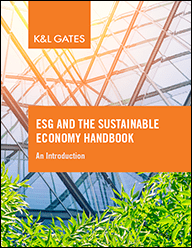CO-HOSTED WITH K&L GATES
November 2-3, 2021
As capital markets, investors, lenders and corporate off-takers accelerate their engagement with the challenges of global warming and other environmental threats, the development of formalized ESG (environmental, social and governance) principles has created great opportunities for renewable energy developers to increase company and project valuations, be more focused in their own M&A decisions, improve their own business processes and those of their suppliers, and obtain financing more easily and at more favorable rates.
However, the relatively recent development of multiple ESG standards and reporting formats, none of which were specifically developed for renewable energy developers, can make it difficult to know exactly how to align their business processes to maximize ESG performance and how to communicate their success at implementing these principles to critical outside partners and investors.
Taught by active market participants who are engaging with ESG issues daily, this ESG for Renewable Energy Financing Master Class will permit renewable development firms to:
- Examine the core aspects and key challenges of accounting for ESG factors in the context of renewable energy project development and operation, as well as corporate finance
- Identify ESG issues throughout the renewable energy project life cycle that can impact obtaining investment and financing, and operational cost
- Get a detailed explanation of how ESG factors flow through project transaction documents to provide an understanding of ESG’s role and impact on contractual agreements & terms
- Obtain tools and techniques to help identify and manage long-term risk grounded in ESG factors
- Develop strategies to handle renewable energy project-specific risks such as load, shape and price risk and their interrelation with ESG principles
Co-Lead instructors are Elizabeth Crouse and Lana Le Hir

